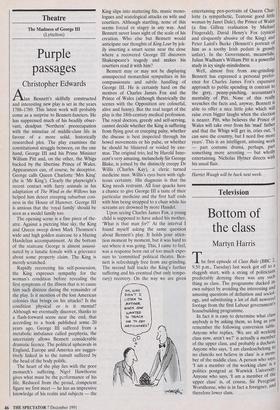Theatre
The Madness of George III (Lyttelton)
Purple passages
Christopher Edwards
Aan Bennett's skilfully constructed and interesting new play is set in the years 1788-1789. This latest work will probably come as a surprise to Bennett-fanciers. He has suppressed much of his beadily obser- vant, deadpan 'Northern' preoccupation with the minutiae of middle-class life in favour of a more solid, historically researched plot. The play examines the constitutional struggle between, on the one hand, George III and his Prime Minister William Pitt and, on the other, the Whigs backed by the libertine Prince of Wales. Appearances can, of course, be deceptive. George calls Queen Charlotte 'Mrs King' (he is `Mr King'). Clearly the playwright's recent contact with furry animals in his adaptation of The Wind in the Willows has helped him detect creeping suburban cosi- ness in the House of Hanover. George III is anxious that the 'royal family' should be seen as a model family too.
The opening scene is a fine piece of the- atre. Against a piercing blue sky, the King and Queen sweep down Mark Thomson's wide and high golden staircase to a blazing Handelian accompaniment. At the bottom of the staircase George is almost assassi- nated by a lunatic female with a grievance about some property claim. The King is merely scratched.
Rapidly recovering his self-possession, the King expresses sympathy for the woman's condition before revealing the first symptoms of the illness that is to cause him such distress during the remainder of the play. Is it mention of the lost American colonies that brings on his attacks? Is the condition physical or is it mental? Although we eventually discover, thanks to a flash-forward scene near the end, that according to a book published some 20 years ago, George III suffered from a metabolic imbalance called porphyria, the uncertainty allows Bennett considerable dramatic licence. The political upheavals in England, Europe and America are sugges- tively linked in to the tumult suffered by the head of the body politic.
The heart of the play lies with the poor monarch's suffering. Nigel Hawthorne gives what must be the performance of his life. Reduced from the proud, Competent figure we first meet — he has an impressive knowledge of his realm and subjects — the
King slips into stuttering fits, manic mono- logues and scatological attacks on wife and courtiers. Although startling, none of this seems forced or stagey in any way. And Bennett never loses sight of the scale of his creation. Who else but Bennett would anticipate our thoughts of King Lear by jok- ily inserting a smart scene near the close where a recovered George III discovers Shakespeare's tragedy and makes his courtiers read it with him?
Bennett may or may not be displaying unsuspected monarchist sympathies in his compassionate and subtle handling of George III. He is certainly hard on the motives of Charles James Fox and the Prince of Wales (although theatrically the scenes with the Opposition are colourful, alive and funny). But the real target of the play is the 18th-century medical profession. The royal doctors, greedy and self-serving, cannot decide whether the King is suffering from flying gout or creeping palsy, whether the disease is best inspected through his bowel movements or his pulse, or whether he' should be blistered or voided by ene- mas. The original trio, led by Harold Inno- cent's very amusing, melancholy Sir George Blake, is joined by the distinctly creepy Dr Willis (Charles Kay), a cleric turned medicine man. Willis's eyes burn with righ- teous certainty. His diagnosis is that the King needs restraint. All four quacks have a chance to give George III a taste of their particular medicine and the first half ends with him being strapped to a chair while his screams are drowned by more Handel.
Upon seeing Charles James Fox, a young child is supposed to have asked his mother, `What is that man for?' At the interval I found myself asking the same question about Bennett's play. It holds your atten- tion moment by moment, but it was hard to see where it was going. This, I came to feel, was a response born out of too much expo- sure to 'committed' political theatre. Ben- nett is refreshingly free from axe-grinding. The second half tracks the King's further suffering and his eventual (but only tempo- rary) recovery. On the way we are given
entertaining pen-portraits of Queen Char- lotte (a sympathetic, Teutonic good little woman by Janet Dale), the Prince of Wales (a fine Giliray realisation by Michael Fitzgerald), David Henry's Fox (cynical and eloquently abusive of the King) and Peter Laird's Burke (Bennett's portrait of him as a toothy Irish pedant is grossly unfair). In the Government, meanwhile, Julian Wadham's William Pitt is a powerful study in icy single-mindedness.
Well, almost free from axe-grinding: Bennett has expressed a personal prefer- ence for Charles James Fox's expansive approach to public spending in contrast to the grey, penny-pinching, accountant's mentality of Pitt. None of this really wrenches the facts and, anyway, Bennett is able to offer a nice little joke which will raise even bigger laughs when the election is nearer. Pitt, who believes the Prince of Wales will take over from his 'mad' father and that the Whigs will get in, cries out, 'I can save the country, but I need five more years'. This is an intelligent, amusing work — part costume drama, perhaps, part something more arresting — but wholly entertaining. Nicholas Hytner directs with his usual flair.


























































 Previous page
Previous page